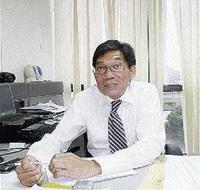ICWI winds up Carib equity fund - Falls short of 10-year target
Published: Wednesday | January 28, 2009

Patrick Williams, CEO of Caribbean Basin Investors Limited, an ICWI subsidiary, and operator of the Caribbean Investment Fund.
The Caribbean Investment Fund (CIF) has cashed in its shares and given its investors a US$20.2 million payday, having achieved less than half of its investment target.
The CIF initially was agreed on in 1993 by Caricom governments to pump at least US$50 million of equity into businesses and projects throughout the region over a 10-year span.
But, the Insurance Company of the West Indies (ICWI)-controlled facility, which only began operations in 2000, started divesting its shares from as early as 2005 - five years ahead of schedule - having invested only US$17.7 million in companies across Caricom.
The decision to wind up the fund is being sold by its managers as a pre-emptive strike against global financial market conditions.
Right decision
"In hindsight, the decision to do so rather than wait until 2009 was right for investors in the fund, given the forecasted sharp economic downturn in economic activity across the Caribbean," said Patrick Williams, chief executive officer of Caribbean Basin Investors Limited (CBIL), operator of the fund.
CBIL is owned by Denis Lalor's ICWI.
Although the CIF was conceptualised as a series of investment funds, its less than stellar performance has placed a hold on any plan to launch another series anytime soon.
All the assets of the CIF have been sold off, with the last payment to investors made in October 2008, Williams said, noting that although the fund had commitments of between US$40 and US$50 million, it only managed to realise the US$17.7 million it invested.
The CIF, operated as a limited liability partnership, was initially managed by Caribbean Equity Partners (CEP), a company led by David Panton, Nigel Clarke and Jeffery Hall under contract to ICWI.
However, in 2003, ICWI, citing contractual differences, ended the arrangement with CEP, which had by then raised most of what capital the fund has been able to garner.
Capital for the CIF was put up by nine entities, led by Multilateral Investment Fund, the investment arm of the Inter-American Development Bank (IDB), which provided just over 21 per cent, followed by the European Investment Bank with 20 per cent.
Other investors included another IDB affiliate, the Inter-American Investment Corporation; Caribbean Development Bank; Delta Airlines; and mutual fund company AIC Limited, owned by Michael Lee Chin.
During its five-year investment phase, the CIF utilised buyouts and venture capital to acquire equity in companies.
According to Williams, however, only a small percentage of CIF funds went into venture capital, which did not work well. Plans for CIF to help raise equity for companies by taking them public also fizzled, a failure Williams blames on the constraint of the enterprises' small size.
"In terms of taking them public, that was one of the objectives but, in my opinion, that was somewhat naive as the capital markets in the Caribbean are just too small and illiquid, and most companies, even big ones in the Caribbean, are just too small to contemplate going public," he said.
The CIF held stakes in firms in Jamaica, Trinidad and Tobago, Bahamas, Antigua and St Lucia.
40 per cent stakes
The Jamaican investments included 40 per cent stakes in IGL and Salada Foods.
The CIF interest in IGL was sold to Ramco Industries, a Trinidadian firm with which they partnered in the joint venture, while the Salada holding was offloaded to the Ideal Group of Companies, owned by Donovan Lewis.
Through Malaika, a Trinidadian company, 40 per cent owned by the CIF, investments were made in other businesses such as Tropicair, Jamaica Jalex Aluminium, Jamaica Plastcom, and Trinidad Henderson Limited, a roofing products manufacturer. These holdings were sold back to Malaika.
The CIF also invested in Cara Hotel in Trinidad and Tobago and St. Lucia.
While the CIF managers would not disclose the overall return on the fund, those investments that yielded nothing were said to have been offset by those that performed well.
sabrina.gordon@gleanerjm.com












